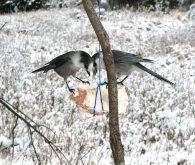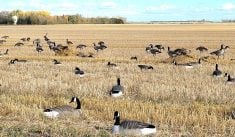Manitoba has its first cases of chronic wasting disease (CWD) in white-tailed deer.
Two cases have been found, both in males of the species and hundreds of kilometres apart. One case was confirmed in southwestern Manitoba in the RM of Grassland, and another in the parkland northwest of Riding Mountain National Park, according to information released by the province March 6.
“The province will continue to review test results, and are reviewing and revising CWD control measures,” said a March 9 provincial statement. “This ongoing review will take into account new infections in white-tailed deer, geographic spread, and population counts, clusters and densities.”
Read Also

Manitoba crop insurance expands wildlife coverage, offers pilot programs
New crop insurance coverage is available to Manitoba farmers.
Why it matters: The prion disease, which targets cervids including deer, elk, caribou and moose, is incurable and fatal.
Manitoba found its first CWD cases in 2021, following years of concern from hunters, conservationists and the elk sector because neighbouring Saskatchewan had been reporting positive results for years.
Most cases were in male mule deer, although some had also been found in white-tailed deer, moose and elk.
By 2021-22, Saskatchewan’s CWD surveillance program reported 644 cases, 459 in mule deer and 167 in white-tailed deer, with the balance found in other species. Although the majority of cases were, and remain, in the western half of that province, Manitoba residents saw the eastward creep of the disease even before cases were confirmed two years ago.
Elk producers in particular had raised the issue with the appearance of mule deer in Manitoba, a species that, at the time, was protected and illegal to hunt, except by Indigenous hunters.
The first positive case heralded a shift in that policy. In late 2021, a visibly ill mule deer was euthanized close to Lake of the Prairies and it tested positive for CWD. A second case was found weeks later in southwestern Manitoba.
Over the next weeks and months, the province introduced control zones, de-population efforts and monitoring requirements. The 2022 hunting season was the first that general hunters could take mule deer.
A total 20 cases have been found since 2021, all in western Manitoba. Of the 18 mule deer found positive, all but one was male.
“There is an aggressive testing program in place,” the province has noted.
Waiting for results
Hunters last fall, particularly those in risk zones, were asked to submit samples as part of the government’s monitoring efforts. Provincial staff also harvested animals as part of the control program.
The province is still working through that glut. Results are pending on 1,982 samples submitted last year. The number of samples has overdrawn the capacity of available Canadian labs, the provincial government has said.
“In November 2022 alone, hunters submitted 5,511 samples out of a total 5,878 samples for the entire year. This influx of samples in a relatively short timeframe for sample processing, data confirmation, and external laboratory capacity has led to significant delays in test result reporting,” a March 9 statement read.
Fifteen 2022 samples have come back positive so far.
Hunters are now waiting 16 to 20 weeks for word on their deer, should they want to use the venison.
While food safety officials maintain the disease is not a threat to human health, they also advise that animals positive for CWD should not be consumed.
The province has said it is “dedicated to reducing this delay and producing test results in a more reasonable timeframe.”
Budget 2023, unveiled in early March, earmarked an extra $880,000 for CWD monitoring and control.
The province has said it will release more information on Manitoba’s CWD status after all samples in the queue have been analyzed.


















